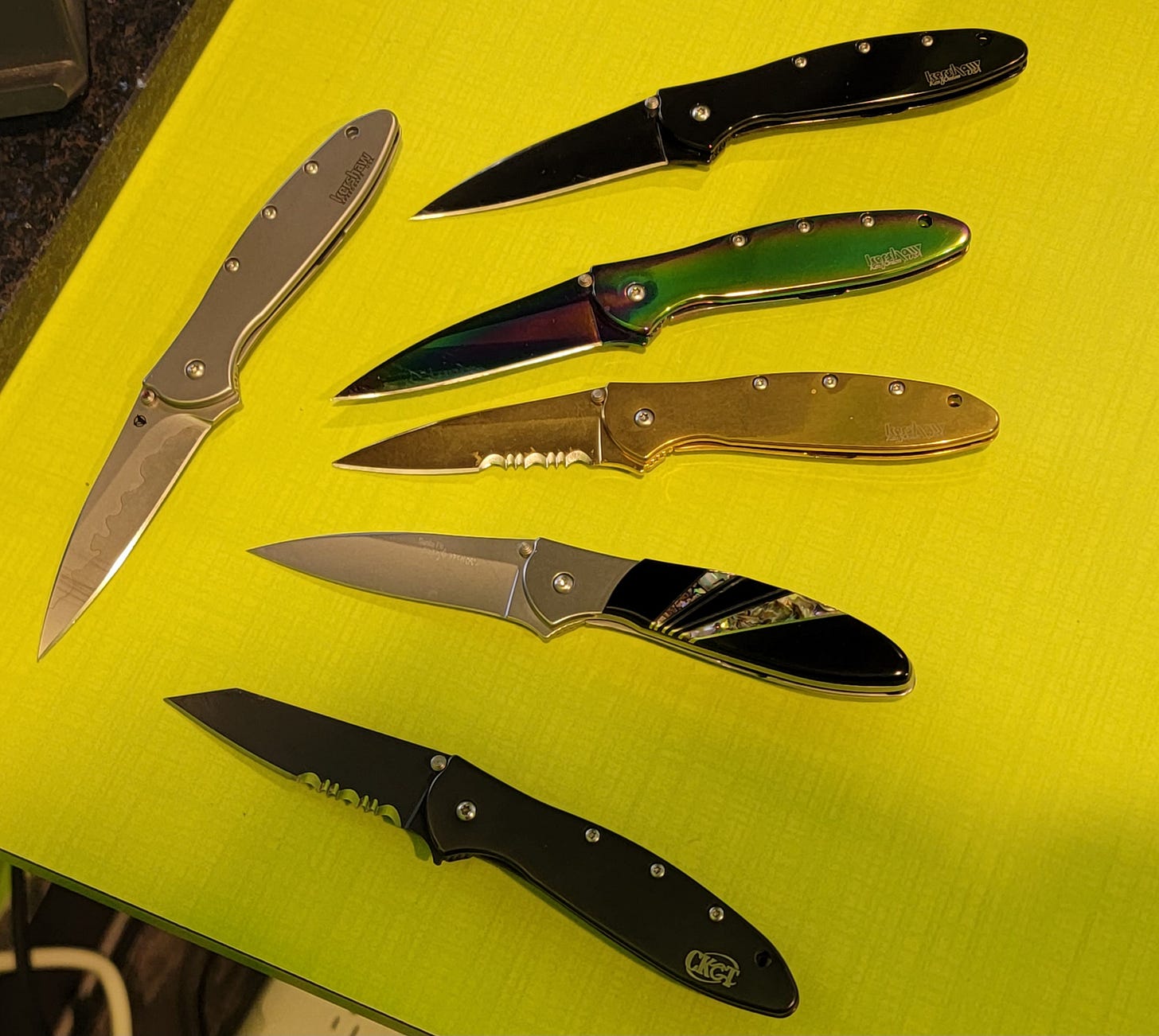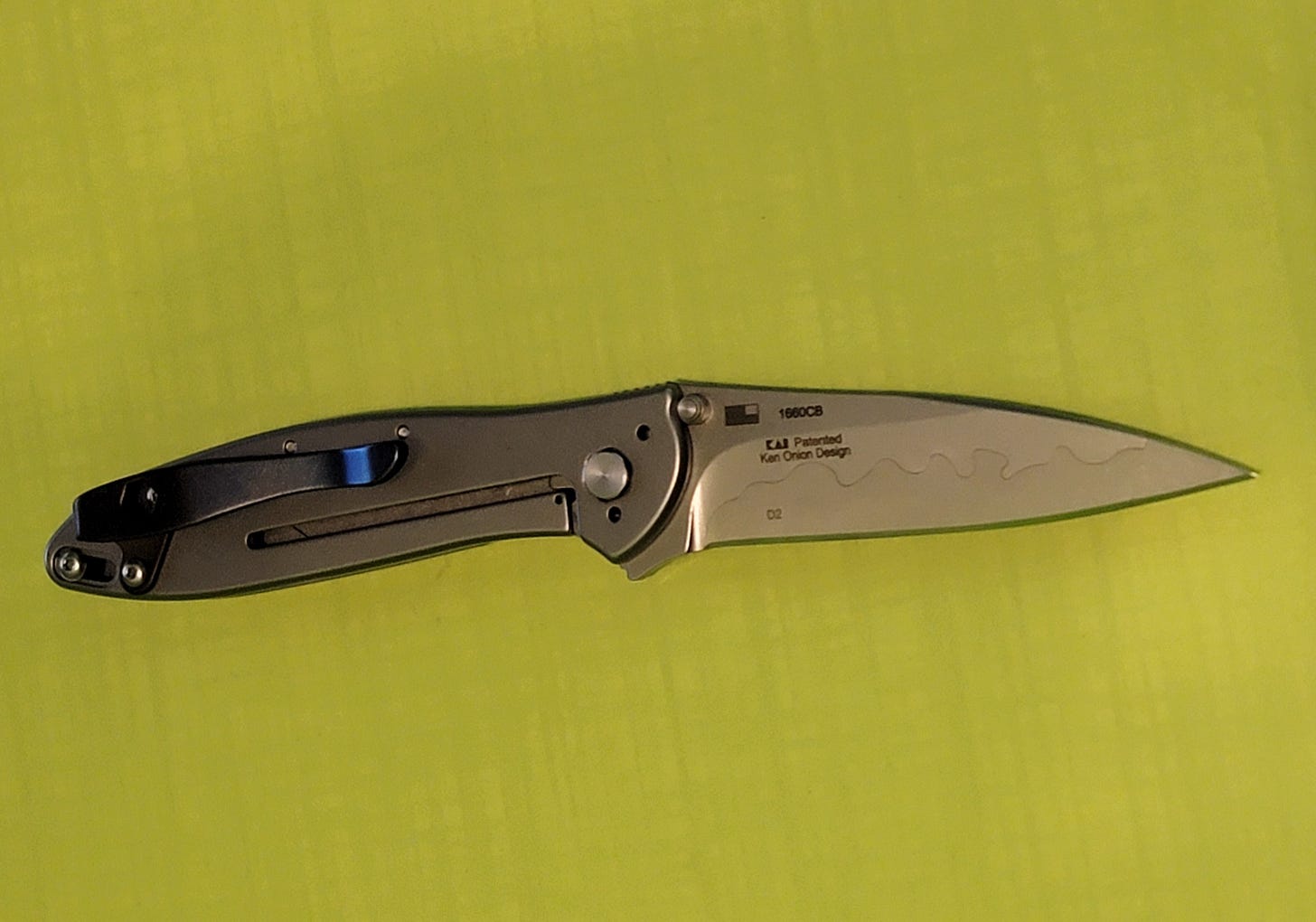Made In The USA, Affordably: Kershaw Leek
As always, these articles are free to read in their entirety
Alright, let’s say the Pro-Tech automatics are still too pricey at $230 or thereabouts… can we get a quick-opening USA-made knife for less? Of course we can! How does fifty-four bucks sound?
The Kershaw Leek has been around so long (the first models were released 23 years ago) and is so widely distributed that I tend to forget that Leek awareness is not completely universal. I was brought back to Earth via a rabbit-hole link-clicking session that ended in this dipshit “everyday commentary” complaint piece on the Leek. I’ll excerpt the relevant section for you:
My resistance to the design is based on knowing that there is better stuff out there, but a lot of that stuff is more expensive or more obscure. You are unlikely to find a Civivi Lumi (which hits on a lot of the same bullet points the Leek does) at a Wal-Mart… My resistance to the Leek is not because it is bad, but because I know there is better… both the Lumi and the TRM Neutron 2 are much better than the Leek and hit the same general design philosophy. The Lumi is a remarkably good knife for the money and the Neutron 2 is one of the three best production knives available.
I have no beef with the TRM Neutron 2, which is a plain-jane $199 folding knife made in Three Rivers, MA — but the Lumi is Chinese trash, sold and marketed by a company that happens to be very generous with free samples and affiliate marketing money. It’s like a Kershaw Leek that costs the same amount of money and isn’t as good, plus it’s made in China.
Interestingly, there are quite a few knife blogs and knife-oriented Redditors specifically pushing Civivi knives over Kershaw Leeks. The reader is free to draw his own conclusions as to why.
This is doubly unfortunate because the Leek is an alpha example of a price-competitive, quality-competitive USA-made product. It’s legal pretty much everywhere, since it’s not an automatic knife; you have to start the spring-powered opening with a mild flick of the “flipper” tab on the back of the blade. In practice it is faster than a front-opening automatic knife (like a Microtech or Benchmade Infidel) and not noticeably slower than a full-automatic Pro-Tech side-opener.
The Leek, like the Ford F-150, can be almost anything you want. The basic $54 model has no real weaknesses; the blade is Swedish-made Sandvik 14C28N and the handles are USA-sourced basic stainless. Want to spend more money? Of course you do — who wouldn’t? Well, you can get Damascus blades, various boutique steels like S30V, or some combinations like the Leek 1660CB above which marries the Sandvik 14C28N backbone with a D2 cutting edge. D2 is very much the Steel O’ The Moment right now. The “Random Leeks” have a Tanto edge that is a tribute to the “Random Task” upscale knife from Kershaw and designer Ken Onion, who is also responsible for the Leek and the slightly smaller Chive.
Leeks come in a few hundred different finishes and styles over and above choice of steel. The only genuinely significant choice to make is between the models with a separate liner and the models where the scales of the knife are also the lock, as was originally done in Chris Reeve knives. You can see the difference below. I recommend the models without separate scales, as the lock looks a bit stronger to me. It’s probably academic, as I’ve never had a Leek fail.
In both photos, the separate-scale model is on the right.
If you want to get even fancier with your Leek, the nice people at Santa Fe Stoneworks embellish basic Leeks with various stones, mother-of-pearl, and other precious materials.
There is no practical difference in the Santa Fe knives, other than a bit more thickness in the handle, which makes the knife easier for some people to use. It also makes them a bit less worrisome-looking to the kind of normal everyday people who don’t carry a knife on their persons.
Prior to Sep 11th you could carry a Leek on a domestic flight, something I did a few times, because the blade is just 3 inches long. Obviously you can’t do it now and there is nothing “stealth” about these knives. They will scream out in a metal detector, millimeter wave scanner, or baggage X-ray. If you want a knife that won’t trip a detector, you want a Mission. Be aware that getting on a domestic flight with a Mission on your person will probably earn you a Federal prosecution. At the very least you’re gonna miss your flight and lose a $500 knife.
There are two legitimate criticisms to be made of the Kershaw Leek. The first is that the “safety” mechanism that protects against accidental flip-opens is completely unnecessary and is far more likely to keep you from opening the knife when you want it to be open. No worries; it removes in seconds with a Torx T6 bit.
The second annoyance is the pocket clip. The good part: unlike 95% of the knives out there you can install the clip for tip-up or tip-down carry. The bad part: it’s very low-profile and it also lets a lot of the knife stick out of your pocket. LynchNW fixes this with a USA-made titanium deep carry clip for $21. It will greatly increase your enjoyment of the knife.
If I had to guess, I would say that the non-sponsored portion of the “Leek fatigue” in the knife hobby is a byproduct of just how good the Leek is. True, it lacks the bulletproof, hyper-precise feel of a Chris Reeve or Pro-Tech but in daily use it’s in no way inferior to those more expensive and better-respected knives.
About sixteen years ago, I was trying to fix a computer for a friend of mine in a hurry and I put a Leek all the way through my left index finger. Amazingly, I didn’t cut any tendons but I did take a deep breath before pulling the knife back out and driving to the urgent care. And yeah it was a serrated-blade model. Just my luck. And at least I know the knife is capable of that!
Devoid of “tacticool” credentials or “special ops” affiliations, the USA-made Kershaw Leek is simply a very good product and likely the best knife you can get for fifty-four dollars. It is recommended without reservation. But I can’t recommend you use it to pry a stubborn power supply out of a heat-welded enclosure.







“It’s like a Kershaw Leek that costs the same amount of money and isn’t as good, plus it’s made in China.” This is my new pet peeve. The “high quality” Chinese products that sell for the same price as things made in non-shithole countries. A few months ago I was buying some socks. I was sick of going through socks so quickly and I was willing to pay more for quality wool socks that would last. I ordered some from “Darn Tough Vermont” and they are great. Merino wool, comfortable, durable, made in the USA, and an unconditional lifetime warranty. They’re like $25 a pair but with the guarantee, you only have to buy them once. Then I discovered there is a company here in Utah “Grip6” that also makes merino wool hiking socks. They knit them in Utah with wool that is grown locally and processed and spun in the US. They sell for about $19 a pair. They also have an unconditional lifetime warranty. I ordered a few pairs from them because, all other things being equal, I would rather support the more local company. I’ve been really pleased with them. They are super soft and they have padding in all the right places and stretch in all the right places. What makes me angry is there is another much larger sock company here in Utah (Stance) that everything they sell is made overseas, they don’t have a lifetime warranty, and they sell for around the same price as the US made ones I bought from Darn Tough and Grip6. Obviously they could produce them in the US and still maintain a competitive price point because there are other people doing it! That means they’ve made the conscious decision to do their manufacturing overseas when they don’t have to. They probably couldn’t maintain their same margins and their celebrity endorsements and their licensing deals but they could make it work. I’m sure it’s not healthy to get so worked up over socks but here I am. Anyways, I heartily recommend the Grip6 and Darn Tough socks.
If any of you knife enthusiasts would like a graphic or some lettering etched on the blade or handle. my new laser can etch stainless. https://rokemneedlearts.com/images/knife.jpg BTW, that's a bread knife, not a mohel messer. Contact info: rokem@netzero.net